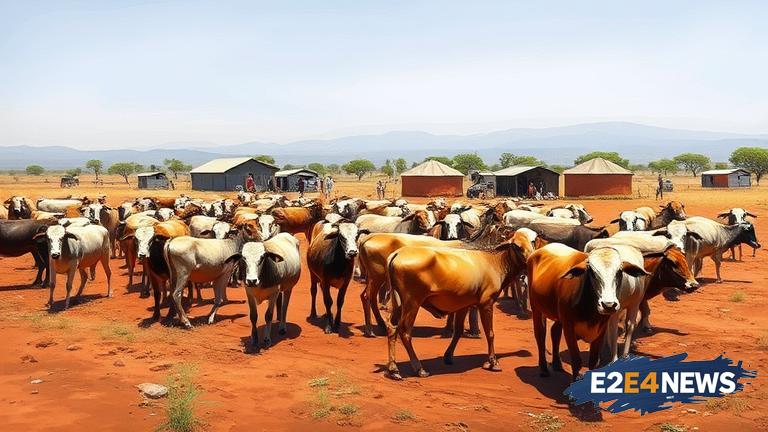The groundbreaking ceremony of the communal feedlot project in Namibia marks a significant milestone in the country’s efforts to develop its livestock industry. The project, which is a collaboration between the Namibian government and the European Union, aims to provide a modern and efficient facility for livestock farmers to feed and manage their animals. The feedlot is expected to have a significant impact on the country’s livestock sector, which is a crucial component of Namibia’s economy. The project is part of a broader initiative to improve the country’s food security and reduce its reliance on imported meat products. The communal feedlot will provide a range of benefits to livestock farmers, including improved animal health, increased productivity, and better market access. The facility will be equipped with modern infrastructure, including feeding and watering systems, veterinary care, and marketing facilities. The project is also expected to create new job opportunities and stimulate economic growth in the region. The European Union has provided significant funding for the project, which is part of its efforts to support the development of Namibia’s agricultural sector. The Namibian government has also committed to providing support for the project, including technical assistance and training for livestock farmers. The communal feedlot project is a key component of Namibia’s National Development Plan, which aims to promote economic growth and reduce poverty. The project is also aligned with the country’s Vision 2030, which aims to make Namibia a prosperous and industrialized nation. The livestock industry is a significant contributor to Namibia’s economy, accounting for around 10% of the country’s GDP. The industry also provides employment opportunities for thousands of people, particularly in rural areas. However, the industry faces a range of challenges, including limited access to markets, inadequate infrastructure, and disease outbreaks. The communal feedlot project aims to address some of these challenges and provide a more sustainable and efficient system for livestock production. The project is expected to benefit a range of stakeholders, including livestock farmers, processors, and consumers. The facility will provide a reliable source of high-quality meat products, which will help to improve food security and reduce the country’s reliance on imported products. The project is also expected to have a positive impact on the environment, by reducing the amount of waste generated by livestock production and promoting more sustainable farming practices. The Namibian government has expressed its gratitude to the European Union for its support for the project, which is seen as a key component of the country’s development strategy. The government has also committed to providing ongoing support for the project, including monitoring and evaluation, to ensure that it achieves its intended objectives. The communal feedlot project is a significant investment in Namibia’s livestock industry, and is expected to have a lasting impact on the country’s economy and food security. The project is a testament to the strong partnership between Namibia and the European Union, and demonstrates the EU’s commitment to supporting the development of Namibia’s agricultural sector. The project is also expected to provide a model for other countries in the region, which are seeking to develop their livestock industries and improve food security.
